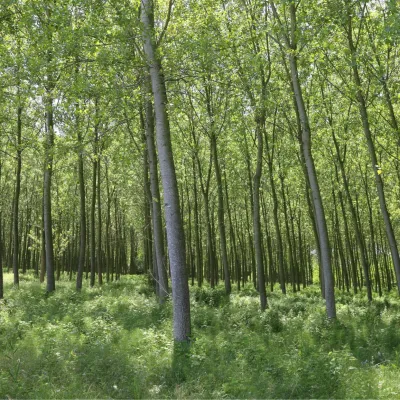General information
RDP Priority
- P1. Knowledge transfer and innovation
RDP Focus Area
- 1A: Innovation & cooperation
RDP Measure
- M01: Knowledge transfer & information actions
Beneficiary type
- Public authority / body
Summary
This project sought to introduce cutting-edge technologies and innovations to abandoned and uncultivated lands by establishing sustainable forests composed of fast-growing clones and hybrids of the Populus genus. By doing so, it fostered forestry development while also ensuring vital protective and ecological functions.
For the first time in Lithuania, this initiative united scientists and Populus growers in a shared effort to exchange knowledge and experience through demonstration trials and to promote innovative techniques for planting and cultivating poplar plantations.
Results
- The project results were demonstrated in six trials in the counties of Kaunas, Utena, Klaipėda, Marijampolė and Šiauliai. In total, the project organised 24 field days, 24 seminars and a conference.
- During these events, participants learned about an exciting possibility for utilising abandoned land and land unsuitable for agriculture: the introduction of especially fast-growing clones and hybrids of the Populus genus.

Promoter
Lithuanian Centre for Agricultural and Forestry Sciences
Funding
RDP support: 119 713 (EUR)
EAFRD: 101 756 (EUR)
National/Regional: 17 957 (EUR)
Ressourcen
Links
Context
Turning abandoned and uncultivated land over to renewable energy production is an emerging priority in Lithuania and other Member States (COM 2008/30). Since bioenergy obtained from biomass is one of the most attractive alternatives among renewable energy sources in Europe (COM 2006/848), the use of abandoned and uncultivated areas for this purpose is an excellent opportunity.
Short-rotation plantations are bred for biomass production using fast-growing trees. This group of trees includes representatives of the poplar (Populus) genus, poplars, aspens and hybrid aspens. They are planted on land that is unsuitable for agricultural crops, as well as on polluted areas for soil remediation. Compared to other types of woody energy plants, trees of the poplar genus are characterised by higher productivity and stronger pollutant accumulation properties.
Project manager S. Kusiene had the idea to encourage farmers, landowners, etc., to use abandoned and agriculturally unsuitable lands in Lithuania to grow fast-growing trees for economic and ecological benefit. However, he realised that forest managers, owners, and users, who must maintain the plantations at their own expense, do not tend to have sufficient knowledge and experience in the cultivation of fast-growing plantations. It was on this basis that the project was designed.
The Lithuanian Agricultural and Forestry Research Centre (lead applicant) is a State research institute that develops research and experimental development actions in the fields of agriculture and natural sciences. The scientists of the Institute had experience with studies on the plantation of clones and hybrids of the Populus genus and were therefore well placed to set up demonstration trials to raise awareness about these techniques.
Objectives
The project aimed to promote advanced cultivation techniques for establishing and maintaining sustainable forests of fast-growing clones and hybrids of the Populus genus on abandoned and uncultivated lands. This would create opportunities not only for the development of forestry as an economic activity, but also for ensuring the other protective benefits provided by tree plantations.
Activities
Project activities included:
- preparing experimental trials at plantations of various ages and genotypes on the estates of forest owners in five counties. Existing populus tree plantations of various ages (from four to 30 years) and varieties were selected for the trials, so that the event participants could see the evolution of different types of cloned tree.
- conducting an assessment and analysis of the condition, growth and biomass accumulation of clonal plantations in different counties. At the outset of the trials, soil fertility and moisture were assessed, the number of trees counted, and the diameter and height of the plantations were measured.
- organising farming experience-sharing groups and setting up experimental demonstration trials. The total area of the demonstration trials was not less than 3 ha. The number of trees to be felled was determined based on the data gathered, and, after felling, the best growth and stem quality (500 pcs. ha-1) were selected and branches were pruned.
- organising a conference, seminars and field days to discuss the issues of implementing innovative technologies in forestry, and the breeding and maintenance of clonal short-rotation plantations. During the project, forest owners, farmers, company employees, college lecturers, consultants, students etc., were introduced to the technologies of breeding and growing plantation forests.
- preparing and publishing information and recommendations (including four information articles and four leaflets) about breeding, growing and using clonal short-rotation plantations. The information was published in the press and on the Internet.
Main results
- Three farming experience-sharing groups were formed, where the progress of the demonstration trials and current activities were discussed (15 meetings).
- The project results were practically demonstrated at six demonstration trials in Kaunas, Utena, Klaipėda, Marijampolė and Šiauliai counties.
- In total, the project organised 24 field days, 24 seminars (reaching 300 people) and one conference (attracting 105 attendees).
- Lithuanian farmers and landowners with unused land areas had the opportunity to see plantations of fast-growing Populus hybrid trees of various ages. They learned how the trees are cultivated to improve the quality of the stem and were also introduced to the maintenance of established plantations using innovative means. This knowledge will help them to make use of their available empty plots, obtaining economic and ecological benefits.
Key lessons
- The project encountered difficulties gathering information about participants due to concerns about data protection.
- Participants seemed to highly appreciate the opportunity to directly discuss issues with scientists and technicians at the demonstration plantations themselves, rather than away somewhere in a meeting room.
- The scientists also gained knowledge about how to present their work in practical terms that make sense to stakeholders.
Rasa Mašalaitė

